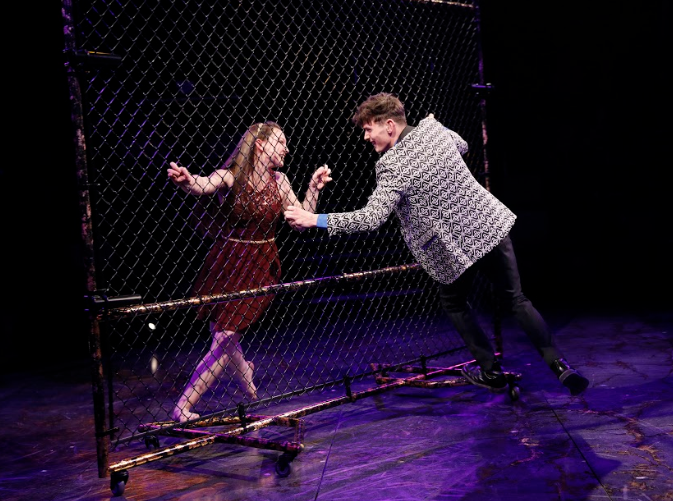 You never know what’s rattling in the mind of a game developer.
You never know what’s rattling in the mind of a game developer.
Until now.
Once in a blue moon something comes along that’s fresh and unexpected. For a small production with a minimalist stage, From Kings to Controllers taps into your imagination with powerful acting and a highly relevant theme.
We open with a backdrop of ’80s-influenced electronica as the realm of beta-testing gamers for an MMO appears, after a Greek-styled chorus recites the introduction to Shakespeare’s “The Rape of Lucrece.” Liv, the developer, reveals her frustrations that the game is highly typical, with a brute hero slasher at the forefront sent to save a damsel in distress. She laments to her girlfriend, Tina, that she’s sick of playing the same tropes. Tina wisely suggests that Liv speak to her studio’s CEO, Trent, about changing the game.
Liv and Trent argue their points: creating something new without tropes vs. using the tried-and-true methods to make money. After all, the more cash they make from one game, the better they can develop exceptional stuff later on. Liv can’t seem to get through to him, and creates a strong female protagonist anyway. She lets one friend in on the secret—the marketing director, Mia. Mia needs her job and is rightfully afraid of losing it.
Liv’s changes create the most successful game the studio has produced, but it means nothing in the face of Great Male Internet Backlash, personified by Tarquinius. (In my notes I lovingly referred to him as “Toxic Male Asshat,” but really he’s the rapist in the Shakespeare poem.)
As events unfold, Lucrece, the poem’s rape victim and main character in “Lucrece’s Revenge,” becomes the conscience for Liv and Mia. Liv endures harassment and threats true to real life events that women in the gaming industry faced during Gamergate (and may still be living through today). Tarquinius pops in as the devil on Liv’s back repeatedly; for every time she boots up her laptop, no amount of support she’s received from her co-workers can ever beat through the tide of an angry misogynist mob. Her girlfriend and mother are also threatened, and Tina’s identity stolen. Cyberspace isn’t safe, and it takes Liv six months to try to return to work.
The moment she’s finally strong enough, Mia tells her she’s been let go from the studio. Trent had also been fired, and Mia had taken his place as CEO. Liv goes through more mental anguish as she reconciles her love of developing vs. the backlash she’s gotten. How can she continue to make better games and help to pave the way for women like her, when everywhere she turns there’s someone threatening the lives of her loved ones? “What can one do in the face of so much hate?”~Lord of the Rings
Throughout, three narrators outline the video game tropes, such as “Damsel in Distress, ” “The Horde,” “The Prize,” “Inadvertant Save,” and “Camping.” Naming the tropes serve to outline each act/scene of the play as they pertain to Liv’s journey. Highlight: Collatine. He’s kind of a Chris Pratt—you’ll see why. There are also beautiful moments that might touch you right in the feels.
With gaming jokes and wit alike, we’re treated to something that’s not just feminist. See, Liv gets a hero’s journey, with actual twists and turns taken from real-life events. As Trent points out, it’s part of why we love games: They reflect ourselves and our paths. In the end…well, I won’t spoil the ending for you. Part of you should write it yourself.
Tickets are available for a mere $15 or less. Show runs through March 19th.
Please see this play. I tweeted to Ghostlight Theatricals that I hope to see FKTC performed in conjunction with PAX. Everyone who loves gaming and theater should see From Kings to Controllers. It’s powerful, poignant, true to life, smart, beautiful, and important. Trust me, you’ll be glad you experienced it.




















